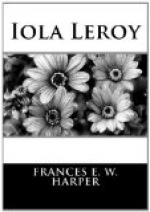“Everything is lobly,” replied the other. The blue sky arching overhead and the beauty of the scenery justified the expression.
Gundover had died soon after the surrender. Frank Anderson had grown reckless and drank himself to death. His brother Tom had been killed in battle. Their mother, who was Gundover’s daughter, had died insane. Their father had also passed away. The defeat of the Confederates, the loss of his sons, and the emancipation of his slaves, were blows from which he never recovered. As Robert passed leisurely along, delighted with the evidences of thrift and industry which constantly met his eye, he stopped to admire a garden filled with beautiful flowers, clambering vines, and rustic adornments.
On the porch sat an elderly woman, darning stockings, the very embodiment of content and good humor. Robert looked inquiringly at her. On seeing him, she almost immediately exclaimed, “Shore as I’se born, dat’s Robert! Look yere, honey, whar did yer come from? I’ll gib my head fer a choppin’ block ef dat ain’t Miss Nancy’s Bob. Ain’t yer our Bobby? Shore yer is.”
“Of course I am,” responded Robert. “It isn’t anybody else. How did you know me?”
“How did I know yer? By dem mischeebous eyes, ob course. I’d a knowed yer if I had seed yer in Europe.”
“In Europe, Aunt Linda? Where’s that?”
“I don’t know. I specs its some big city, somewhar. But yer looks jis’ splendid. Yer looks good ’nuff ter kiss.”
“Oh, Aunt Linda, don’t say that. You make me blush.”
“Oh you go ’long wid yer. I specs yer’s got a nice little wife up dar whar yer comes from, dat kisses yer ebery day, an’ Sunday, too.”
“Is that the way your old man does you?”
“Oh, no, not a bit. He isn’t one ob de kissin’ kine. But sit down,” she said, handing Robert a chair. “Won’t yer hab a glass ob milk? Boy, I’se a libin’ in clover. Neber ’spected ter see sich good times in all my born days.”
“Well, Aunt Linda,” said Robert, seating himself near her, and drinking the glass of milk which she had handed him, “how goes the battle? How have you been getting on since freedom?”
“Oh, fust rate, fust rate! Wen freedom com’d I jist lit out ob Miss Johnson’s kitchen soon as I could. I wanted ter re’lize I war free, an’ I couldn’t, tell I got out er de sight and soun’ ob ole Miss. When de war war ober an’ de sogers war still stopping’ yere, I made pies an’ cakes, sole em to de sogers, an’ jist made money han’ ober fist. An’ I kep’ on a workin’ an’ a savin’ till my ole man got back from de war wid his wages and his bounty money. I felt right set up an’ mighty big wen we counted all dat money. We had neber seen so much money in our lives befo’, let alone hab it fer ourselbs. An’ I sez, ’John, you take dis money an’ git a nice place wid it.’ An’ he sez, ‘Dere’s no use tryin’, kase dey don’t want ter sell us any lan’.’ Ole Gundover said, ’fore he died, dat he would




